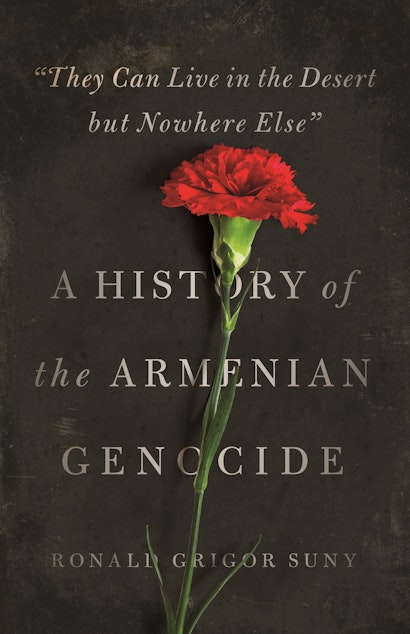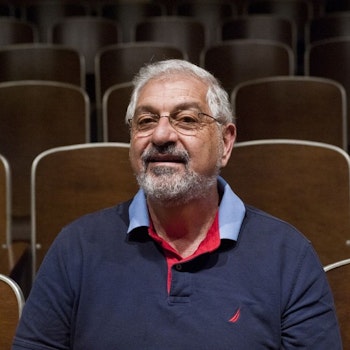"In recent years scholars of Ottoman history have published a number of path-breaking, award-winning academic studies documenting the annihilation of the Armenians in 1915. Published on the one hundredth anniversary of that horrible event, Ronald Grigor Suny's monograph stands out as another superb work, in this case the best narrative account explaining ‘why, when, and how' the Armenian genocide occurred."—Marc David Baer, H-Nationalism
"An authoritative examination of unspeakable horrors. . . . [D]eeply researched, fair-minded. . . . Suny creates a compelling narrative of vengeance and terror."—Kirkus
"The centenary [of the Armenian Genocide] has raised the diplomatic temperature and precipitated many books. Ronald Suny's is the best of them: Balanced, scholarly, and harrowing, it should be read by all serious students of modern history."—Dominic Green, Weekly Standard
"Suny is admirably dispassionate in explaining the particular circumstances that led the Ottoman government to embark on a policy of mass extermination."—Dominic Lawson, Sunday Times
"[W]hat distinguishes Suny's scholarship is a scrupulous attention to context and the genuine imperial anxiety of the Young Turks. They Can Live in the Desert but Nowhere Else (a title taken from another Talat diktat) is a fair-minded account. Unsparing in depicting the viciousness of the killing, forced conversions and kidnapping of children and young women, it is rigorous in its choice of language and nuance, generous in its empathy but implacable in its conclusions."—David Gardner, Financial Times
"A tremendously powerful, scrupulously balanced, rigorous and humane account of a tragedy that still casts a shadow over the modern state of Turkey. It is likely to become the definitive reference book on the subject for years to come."—Justin Marozzi, Spectator
"They Can Live in the Desert but Nowhere Else will very likely be the standard account in English for the 21st Century of the Armenian Genocide and its broader setting. The event itself was the first major genocide in what was to be an entire century of genocides, and Suny is keenly aware of the lessons it can teach about the horrors it initiated. The book is strongly recommended."—Steve Donoghue, Open Letters Monthly
"Magisterial."—Brian Bethune, Macleans
"[A]n excellent source for readers wishing to learn the history [of the Armenian Genocide]. Suny has provided an exhaustive, dispassionate treatment, situating the Genocide in the centuries-long relationship between Armenian Christians and their Turkish Muslim rulers . . . readable and thorough."—Mark Movsesian, First Things
"An authoritative, comprehensive study of political, religious, and cultural factors around the terrible events of 1915-16, and an account which avoids the propagandism of both Turkish and Armenian advocates, yet does not flinch from their appalling reality."—Mainstream
"[A] fine scholarly study."—Christopher Allmand, The Tablet
"Suny weaves this complex story into a nuanced, meticulously researched, and compellingly argued book."—Choice
"A remarkable work of history."—Howard Eissenstat, Current History
"If you read one book about the 1915 genocide, make this it. Suny is one of the western world's most renowned scholars of the Caucasus region. His account of the fate that befell the Armenians at Ottoman Turkish hands is harrowingly detailed and scrupulously objective."—Tony Barber, Financial Times
"A historical masterpiece and a significant benchmark in the study of the Genocide, which will surely become the definitive textbook on the subject. . . . Comprehensive and compelling."—Sossie Kasbarian & Kerem Öktem, Caucasus Survey
"The book under review should be of an interest to graduate and postgraduate research students, genocide scholars and historians interested to gaining fresh understandings of the historical dynamics leading to the Armenian genocide, and the connections between imperialism, nationalism and the Armenian genocide during the twentieth century. Additionally, the book provides the groundwork for further debate on how to integrate the Armenian genocide more completely within an understanding of the historical trends of its period."—Eldad Ben-Aharon, H-Soz-Kult
"[A] superb work, in this case the best narrative account explaining ‘why, when, and how' the Armenian genocide occurred."—Marc David Baer, H-Net Reviews
"They Can Live in the Desert but Nowhere Else will no doubt become the definitive account of this contested history. . . . This book provides a sophisticated synthesis of recent research without sacrificing depth, nuance or narrative clarity. The fate of the Armenians is situated firmly within wider historiographies of imperial competition and decline, total war and the rise of nation-states. . . . Suny's approach therefore powerfully demonstrates for non-specialists the salience of the fate of the Armenians for understanding much broader historical processes at work at the end of the ‘long' nineteenth century."—Jo Laycock, Patterns of Prejudice
"They Can Live in the Desert but Nowhere Else stands out as a superbly researched, carefully balanced and compelling account. . . . This remarkable book shows how seeking deeper historical truths does not detract from justice: Suny's brilliant, careful and seemingly detached analysis makes the book all the more powerful in this respect."—Gilles Andréani, Survival
"A transitional text. . . . Accessible and concise, while still complex enough to do justice to the relationships between Armenians, their rulers and their neighbours over the centuries."—Susan Pattie, Chartist
"This stunning book makes a significant contribution to genocide studies but also to Armenian, Russian, European, and international history. . . . Suny's masterful narrative is proof that in great scholarship, empathy and analytical rigor work together."—Doris L. Bergen, Russian Review
"Suny sees the genocide not just as an outcome of the difficult transition from empire to nation-state, but also as motivated by the role of hatred and fear of the Armenians by the modernizing elite; it was something more than competing nationalisms or a misguided sense of raison d'état. Qualifying hatred is often the most difficult task faced by the historian. Ignoring its reality in late Ottoman history has been among that historiography's greatest failings."—Keith David Watenpaugh, American Historical Review
"A fascinating historical account of the genocide of the Armenians toward the end of the First World War. A History of the Armenian Genocide is perhaps the most comprehensive and well-written account on the subject, with the help of marshaling historical information from archival documents and various eyewitness accounts. . . . A wonderful piece of sophisticated, evidence-based, and analytically astute historical work."—Salvador Santino F. Regilme Jr., Human Rights Review
"The centennial of the Armenian Genocide has and will generate many scholarly studies and publications to commemorate this tragic event, the first genocide of the twentieth century. Prominent historian Ron Suny's excellent study stands out for the quality of its research, its judiciousness, and its breadth and depth. This is an invaluable, illuminating, and well-written book—a must-read."—Vartan Gregorian, president of Carnegie Corporation of New York
"Just how did the Armenian Genocide happen? One extreme view is that the intrinsically murderous Young Turk leaders had made up their minds long before 1915 and were simply biding their time. At the opposite end, apologists have seen no ideological intent whatsoever, arguing instead that the genocide was an inevitable, short-term reaction to Armenian nationalist activity. Against both views, Ronald Suny's illuminating and impeccable narrative argues that an ‘affective disposition' that developed among Turkish nationalists over many years led to the slaughter. This cuts to the heart of the matter."—Halil Berktay, Sabancı University, Istanbul
"I don't think it's an exaggeration to say that there is no one else in the world who is better able than Ronald Suny to provide a one-volume history of the Armenian Genocide. This is the best book we have on the subject. The narrative is fluid, the writing is crystal clear and engaging, and the scholarship is impeccable. Scrupulously fair-minded, Suny deepens our understanding of the causes of the genocide without, however, rationalizing it."—Norman Naimark, author of Stalin's Genocides
"This is an excellent comprehensive history of the Armenian Genocide—nuanced, balanced, authoritative, and based on a wide range of sources and perspectives. The interpretation is state of the art and the book is written with Ronald Suny's customary clarity and precision."—Donald Bloxham, author of The Final Solution: A Genocide
"Ronald Suny treats the Armenian Genocide in a balanced and thoughtful way, avoiding the pitfalls of both nationalist history and denial. He shows empathy and respect for the victims while at the same time explaining why the Young Turks did what they did, and why they thought they had to do it."—Erik Jan Zürcher, author of Turkey: A Modern History
"Suny's mission is to present a full picture of both sides rooted in deep history. His book, compiled with a mastery of sources, is an act of remembrance itself."—Tom Payne, Sunday Telegraph


